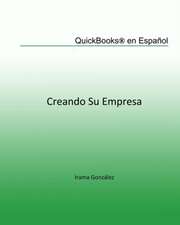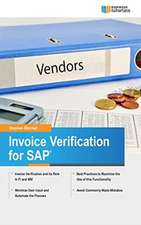Introductory Accounting: A Measurement Approach for Managers
Autor Daniel P. Tinkelmanen Limba Engleză Paperback – dec 2015
Providing students with the context to understand how and why accounting is a valuable part of business, readers will gain an understanding of accounting’s role in financial analysis and managerial decision-making. Tinkelman discusses accounting as an imperfect measurement system, offering guidance on how quantitative data can benefit analysts and managers when used with an understanding of its limitations. The book is strongly grounded in research, and also draws on plenty of examples and cases to bring these issues to life.
The conversational style of Introductory Accounting will appeal to MBA students, while key terms and illustrative problems make assignments easy for instructors. Additional materials for students and instructors are available on the book’s companion website.
| Toate formatele și edițiile | Preț | Express |
|---|---|---|
| Paperback (1) | 1020.03 lei 6-8 săpt. | |
| Taylor & Francis – dec 2015 | 1020.03 lei 6-8 săpt. | |
| Hardback (1) | 1817.36 lei 6-8 săpt. | |
| Taylor & Francis – 10 dec 2015 | 1817.36 lei 6-8 săpt. |
Preț: 1020.03 lei
Preț vechi: 1243.95 lei
-18% Nou
Puncte Express: 1530
Preț estimativ în valută:
195.20€ • 211.97$ • 163.97£
195.20€ • 211.97$ • 163.97£
Carte tipărită la comandă
Livrare economică 22 aprilie-06 mai
Preluare comenzi: 021 569.72.76
Specificații
ISBN-13: 9781138956216
ISBN-10: 113895621X
Pagini: 594
Ilustrații: 7 black & white illustrations, 99 black & white tables, 1 black & white halftones, 6 black & white line drawings
Dimensiuni: 178 x 254 x 35 mm
Greutate: 1.02 kg
Ediția:1
Editura: Taylor & Francis
Colecția Routledge
Locul publicării:Oxford, United Kingdom
ISBN-10: 113895621X
Pagini: 594
Ilustrații: 7 black & white illustrations, 99 black & white tables, 1 black & white halftones, 6 black & white line drawings
Dimensiuni: 178 x 254 x 35 mm
Greutate: 1.02 kg
Ediția:1
Editura: Taylor & Francis
Colecția Routledge
Locul publicării:Oxford, United Kingdom
Public țintă
PostgraduateCuprins
Part I: Introduction
1. Introduction to accounting as a measurement system
Part II: Measurement under ideal conditions
2. Classifying and measuring activities
3. Reporting measurements
4. Using financial accounting measurements
5. Using managerial accounting measurements
Part III: Complications and limitations
6. Strategic reaction to measurement
7. Valuation choices
8. Uncertainty
9. Allocations in financial reporting
10. Cost allocations in managerial accounting (with appendix on the theory of constraints and throughput accounting)
11. Controlling measurement and reporting to minimize errors
Part IV: Introduction to a Case Study
12. Rebeli Press, Inc.—The First Year
Appendices
A. Record-keeping systems
B. Present value concepts
1. Introduction to accounting as a measurement system
Part II: Measurement under ideal conditions
2. Classifying and measuring activities
3. Reporting measurements
4. Using financial accounting measurements
5. Using managerial accounting measurements
Part III: Complications and limitations
6. Strategic reaction to measurement
7. Valuation choices
8. Uncertainty
9. Allocations in financial reporting
10. Cost allocations in managerial accounting (with appendix on the theory of constraints and throughput accounting)
11. Controlling measurement and reporting to minimize errors
Part IV: Introduction to a Case Study
12. Rebeli Press, Inc.—The First Year
Appendices
A. Record-keeping systems
B. Present value concepts
Recenzii
Introductory Accounting is a breath of fresh air in the accounting library. It dares to depart from the well-trodden path of introductory accounting texts by presenting accounting as a solution to a societal problem, beyond a set of rules. Tinkelman’s problem-solving approach to accounting measurement, carefully embedded in research, will appeal to instructors and students, alike.—Shyam Sunder, Yale School of Management, USA
In this innovative accounting text, Tinkelman combines financial accounting with managerial, introduces relevant research, and organizes topics better than other books. Introductory Accounting should be seriously considered for adoption by any accounting instructor.—Baruch Lev, Leonard N. Stern School of Business, New York University, USA
Tinkelman’s Introductory Accounting is thoughtful and lucidly written, an admirable synthesis of the accounting profession’s longstanding concerns with accounting measurement and modern social science. It provides an intellectually broadminded yet practical foundation in financial and managerial accounting for managers.—Stephen G. Ryan, Leonard N. Stern School of Business, New York University, USA
In this innovative accounting text, Tinkelman combines financial accounting with managerial, introduces relevant research, and organizes topics better than other books. Introductory Accounting should be seriously considered for adoption by any accounting instructor.—Baruch Lev, Leonard N. Stern School of Business, New York University, USA
Tinkelman’s Introductory Accounting is thoughtful and lucidly written, an admirable synthesis of the accounting profession’s longstanding concerns with accounting measurement and modern social science. It provides an intellectually broadminded yet practical foundation in financial and managerial accounting for managers.—Stephen G. Ryan, Leonard N. Stern School of Business, New York University, USA
Descriere
Introductory Accounting adopts a measurement approach to teaching MBA students the basics of accounting. Integrating financial and managerial principles from around the globe, it links accounting to other areas of business. Tinkelman discusses accounting as an imperfect measurement system, offering guidance on how quantitative data can benefit analysts and managers. The book is strongly grounded in research and also draws on plenty of examples and cases that bring these issues to life. Additional materials for students and instructors are available on the book’s companion website.
















